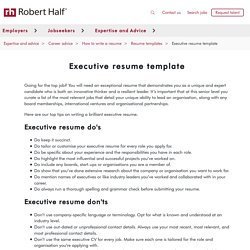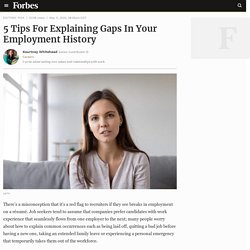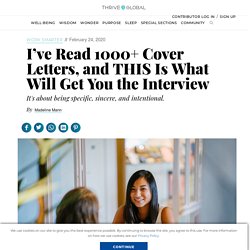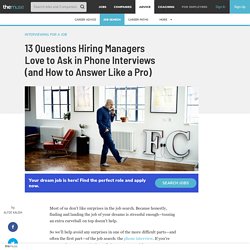

Tips for creating a New Zealand-style CV. Executive resume template. This executive resume example works because it adheres to basic resume-writing best practice.

It is concise, yet detailed, roles are ordered chronologically and the resume uses plenty of bullet-points to call out key accomplishments and achievements. The candidate has an extensive list of educational accolades, leadership experience and two noteworthy memberships, all of which are cited clearly on this executive resume template. The memberships also indicate enthusiasm for innovation and new talent, and show that over time, strong networks have been developed by this candidate. These too are critical parts of an executive CV.
Making your executive resume exceptional is about ensuring it is tailored specifically to the role and organisation you’re applying to, and that the best parts of your experience are detailed clearly.
5 Tips For Explaining Gaps In Your Employment History. There’s a misconception that it’s a red flag to recruiters if they see breaks in employment on a résumé.

Job seekers tend to assume that companies prefer candidates with work experience that seamlessly flows from one employer to the next; many people worry about how to explain common occurrences such as being laid off, quitting a bad job before having a new one, taking an extended family leave or experiencing a personal emergency that temporarily takes them out of the workforce. However, recruiters are used to dealing with candidates in these situations and rarely is it a cause for concern. It isn’t the break in employment that hurts a candidate’s chances at landing their next job, it’s often how they choose to describe the situation that mistakenly creates a negative perception of their temperament or abilities. 1.
Assume that recruiters have good intentions 2. 3. 4. I’ve Read 1000+ Cover Letters, and THIS Is What Will Get You the Interview. There is a nasty rumor going around that recruiters and hiring managers do not read cover letters.

The truth is, many large companies use software to scan resumes for keywords and then forward those candidates deemed qualified to the HR team. In this case, your stunning cover letter would not help you get to the first round. I get it, this is frustrating because job seekers spend a lot of time applying without much signal or feedback throughout the process. Which leads to LinkedIn posts like this that encourage job seekers to stop writing cover letters all together: But for us little guys—the companies who hire dozens instead of hundreds; the start ups looking to change the world with team members who are equal parts talented and passionate; the tribes where each new person immediately sends ripples through the culture—we read every cover letter, and make our interview decisions based on them.
The other important “why” in the cover letter is “why this company”? 1. Dear Sir/Madam, 2. Best, 13 Common Phone Interview Questions (and Answers!) Most of us don’t like surprises in the job search.

Because honestly, finding and landing the job of your dreams is stressful enough—tossing an extra curveball on top doesn’t help. So we’ll help avoid any surprises in one of the more difficult parts—and often the first part—of the job search: the phone interview. If you’re unsure what to expect in that call, here are some of the more common phone interview questions you might face, and some advice on how to answer them with ease. But First: Why Are Phone Interviews a Thing? Phone interviews are, as you can imagine, convenient. How to Answer the Most Common Interview Questions.
Wouldn’t it be great if you knew exactly what questions a hiring manager would be asking you in your next job interview?

We can’t read minds, unfortunately, but we’ll give you the next best thing: a list of more than 40 of the most commonly asked interview questions, along with advice for answering them all. While we don’t recommend having a canned response for every interview question (in fact, please don’t), we do recommend spending some time getting comfortable with what you might be asked, what hiring managers are really looking for in your responses, and what it takes to show that you’re the right person for the job.
Consider this list your interview question and answer study guide. Classic Questions These frequently asked questions touch on the essentials hiring managers want to know about every candidate: who you are, why you’re a fit for the job, and what you’re good at. 1. This question seems simple, so many people fail to prepare for it, but it’s crucial. 2. 3. 4. 5. 6. 7. 8. 9. The 30 Best Tips to Prepare for an Interview.
Preparing for an interview takes a lot more than Googling a list of common interview questions. You have to make a great first impression appearance-wise (no wrinkly suits here!) , have a great knowledge of your target company and its product, and, of course, know exactly how to convey that you're the perfect fit for the job.